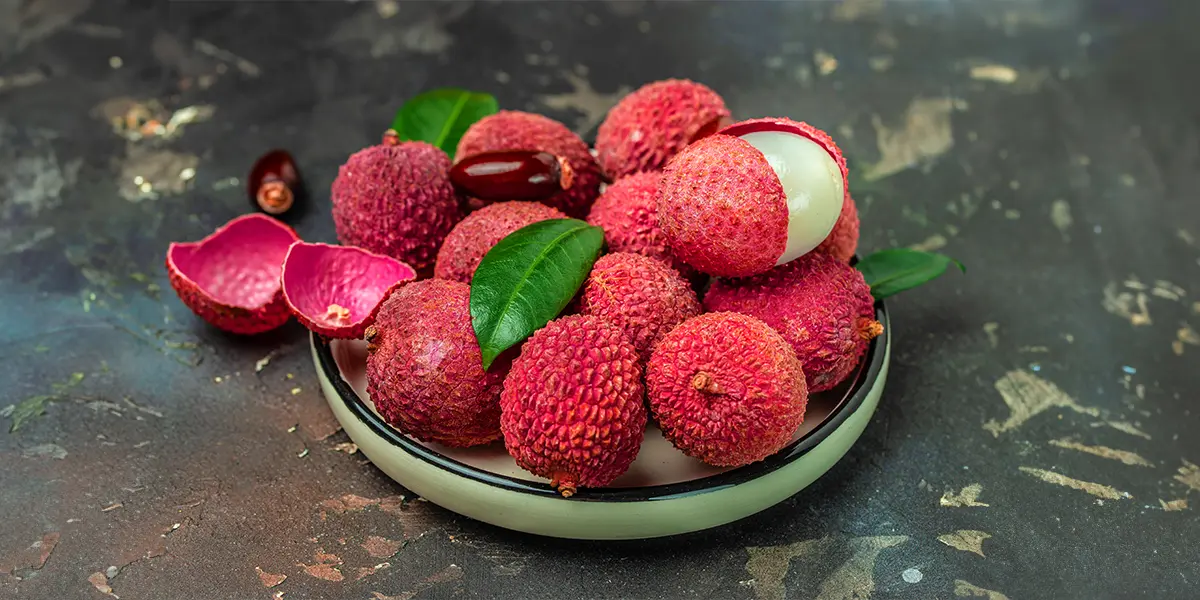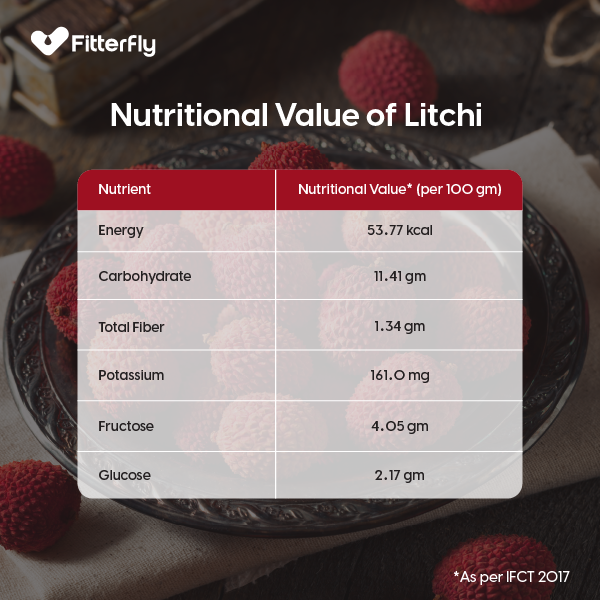
Ever wondered if Litchi, that delicious and juicy fruit, is a good choice for people with diabetes? We all know how important it is to make smart food choices when managing diabetes and keeping our blood sugar levels in check.
Litchi, also spelled lychee, is a tropical fruit known for its sweet and floral flavor. But what is litchi exactly?
Remember those summer days when you eagerly peeled away the rough, reddish skin to reveal the juicy, translucent flesh inside? It’s not just a delicious treat; it’s a fruit packed with vitamins, minerals, and antioxidants, making it both a nostalgic delight and a healthy choice.
In this article, we’ll dig deep into the question: Is Litchi good for diabetes? We’ll explore the nutritional value of Litchi, its impact on blood sugar levels, and its potential benefits for individuals managing diabetes.
So, grab a litchi and let’s get started!
The Nutritional Value of Litchi
Let’s start by looking at what Litchi is made of. This tropical fruit is delicious and a powerhouse of essential nutrients that contribute to overall health with 100g, which is approx 10-12 small litchi’s containing.

Apart from this, here’s what you can find in Litchi:
1) Vitamins & Antioxidants
Litchi fruit is packed with something called vitamin C, which is super important for keeping our immune system strong. In every 100 grams of litchi, there are about 54.9 milligrams of vitamin C. That’s like 91% of what you need for the day!
Isn’t that amazing?
Just by eating a cup of litchi, you can get a good amount of vitamin C, which helps protect your body from getting sick and helps you stay healthy.
So, if you want to keep your immune system strong, grab some litchi and enjoy!
2) Dietary Fiber
Fibre content is low in litchi, it causes spikes in blood sugar levels. Therefore, a person with diabetes should consume litchi occasionally and in moderation.
3) Minerals
Litchi is a good source of essential minerals like potassium and copper. Potassium is important for maintaining proper heart function and regulating blood pressure.
On the other hand, copper is involved in several enzymatic reactions in the body and plays a role in the production of RBCs, i.e., Red blood cells.
The Glycemic Index of Litchi
Let’s talk about Litchi’s glycemic index (GI). The GI assesses how rapidly a specific food increases your blood sugar levels.
When it comes to Litchi, its GI is 50, which falls in the medium GI range. This means that consuming Litchi may cause a moderate increase in your blood glucose levels.


However, it’s worth noting that the GI can vary depending on factors such as how ripe the Litchi is and how it’s consumed.
Is Litchi Good for Diabetes?
Litchi can be included in a moderation diabetes-friendly diet plan. While litchi has a natural sweetness, it also contains important nutrients such as vitamin C, potassium, and fiber.
The key is to monitor portion sizes to prevent spikes in blood sugar levels.
To know your chances of Diabetes reversal, take the Diabetes Reversal TestDiabetes Reversal
Calculator
How much Litchi should a Person with Diabetes Eat?
If you have diabetes, you might wonder how Litchi fits into your overall blood sugar management plan.
Well, here’s the scoop: while all fruits contain natural sugars, it can still be a part of your diabetes-friendly diet as part of a well-balanced meal. Litchis contain natural sugars that can raise blood sugar levels.
Stick to a small portion, like 2-3 litchis, to satisfy your craving without causing a significant spike in blood sugar. Monitor your levels to see how litchis affects you personally. Find the right balance and make smart choices for your health.
Remember, Portion control is the key! To control blood sugar spikes further, pair Litchi with protein, fiber, and healthy fats like milk, yogurt, nuts, and oilseeds. This combination can help slow down the absorption of sugars, keeping your blood glucose levels stable.
Benefits of Litchi for Diabetes
Now let’s explore Litchi’s potential benefits for not only people with diabetes but all. Beyond its natural sugar content, Litchi has some qualities that make it a valuable addition to any diet.
Here are a few benefits to consider:
1) Hydration and Nutritional Balance
Litchi has high water content and can contribute to hydration, especially during hot summer. Staying properly hydrated is important for everyone, including individuals with diabetes.
Additionally, Litchi provides essential vitamins and minerals, such as vitamin C, potassium, and copper, which support overall health and help maintain a nutritional balance.
2) Flavorful Alternative to Unhealthy Snacks
One of the challenges of managing diabetes is finding satisfying and healthy snack options. Litchi can be a great alternative to unhealthy snacks high in added sugars and unhealthy fats like candy bars, potato chips, and sugary desserts.
Its natural sweetness and refreshing taste make it flavorful. By opting for Litchi in portion control instead of processed snacks, you can enjoy a nutrient-dense fruit and make a healthier food choice.
3) Finding Your Balance
Finding the right balance between enjoying Litchi and managing diabetes is significant. Everyone’s body is different, so it’s a good idea to monitor your blood sugar levels.
Ask a healthcare professional or nutrition coaches for advice. They know a lot about diabetes and can give you personalized tips based on what’s best for you.
Checking your blood sugar levels daily and regularly helps you understand how your body reacts to Litchi. It gives you valuable information about how much Litchi you can have.
How often, in a way that works well for your body and aids in maintaining stable blood sugar levels. It’s like having a roadmap to guide your decisions about enjoying Litchi.
Tips for Safe Consumption of Litchi in Diabetes
1. Moderation is Key: Limit the intake of litchi to a small serving.
2. Pair with Protein: Combining litchi with protein or healthy fats can help manage blood sugar levels.
3. Monitor Blood Sugar: Keep track of your blood sugar levels before and after consuming litchi to understand its impact on your body.
How to Incorporate Litchi in Your Diabetes-Friendly Diet?
Litchi can be a refreshing addition to your diet when consumed thoughtfully.
Here are some ideas to include in your diet:
1. Best way to have litchi is as a whole fruit.
2. You can enjoy litchi with nuts like akhrot (walnuts), kaju (cashews), and pista (pistachios).
3. Use litchi as a topping for whole-grain cereal or oatmeal.
Litchi Recipes for People with Diabetes
1. Litchi and Berry Parfait: Layer dahi over litchi in a glass. Top it up with nuts for added crunch.
2. Litchi Chia Pudding: Mix chia seeds with water or plain milk, and let it sit overnight. Add fresh litchi and a few pinch of cinnamon in the morning.
Reduced HbA1c by HALF in 6 months


6.6%
Happy members
EMI
Guarantee
4.8/5
Diabetes Prime Program
FitterTake
Litchi can be a delicious addition to your diabetes management plan when enjoyed in moderation. With its delightful flavor and potential health benefits, Litchi can bring joy to your taste buds while supporting your overall well-being.
Just keep an eye on portion sizes, check your blood sugar levels regularly, and seek advice from healthcare professionals to ensure you find the perfect balance.
To be certain, we suggest you also speak to our diabetes healthcare team, which has an expert dietician, nutritionist and psychologist to understand the benefits of litchi in diabetes and much more.
To learn more about Fitterfly’s Diabetes Care Program and how it can help you intelligently take control of your diabetes, you can sign up or just give us a missed call at 08068507599, and we will definitely get back to you.
So, enjoy your litchi responsibly and savor the sweetness it brings to your life!
This blog provides general information for educational and informational purposes only and shouldn't be seen as professional advice.
Frequently Asked Questions
What are the Potential Risks and Considerations of eating litchi for a person with diabetes?
People with diabetes should be mindful of the sugar content in litchi. Consuming large quantities can lead to elevated blood sugar levels. It's important to incorporate litchi into a balanced diet and consult with a healthcare provider for personalized advice.
Does litchi affect blood sugar levels?
Litchi can affect blood sugar levels due to its natural sugar content. It’s important to consume it in moderation.
When is the best time for people with diabetes to eat litchi?
It’s best to have litchi or any other fruit as a sack between meals and not with the meals.
Can litchi help in managing diabetes-related complications?
Litchi contains antioxidants and nutrients that may support overall health, but it should not be relied upon solely for managing diabetes-related complications.
Is litchi low in glycemic index?
Litchi has a moderate glycemic index, so it should be consumed in controlled portions to manage blood sugar levels.
Does litchi reduce blood sugar levels?
Litchi does not reduce blood sugar levels; it can actually increase them if eaten in large quantities.
Does litchi have a high sugar content?
Litchi has a relatively high natural sugar content, so moderation is essential for people with diabetes.




















